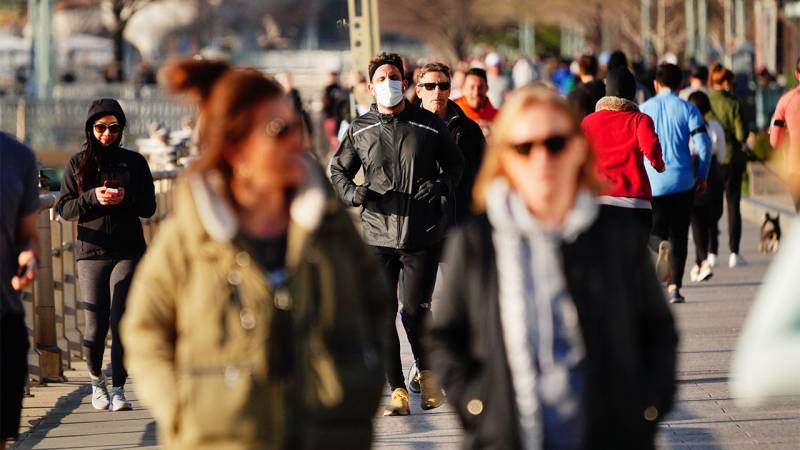
Despite the consistency in the recommendation that symptomatic individuals and those in health-care settings should use face masks, discrepancies were observed in the general public and community settings while the rationality of mask usage has come under debate.
As cases of coronavirus (COVID-19) spiralled up last month, people in Europe and North America rushed to get their hands on surgical masks. Ironically, Health officials jumped in to discourage them: “Seriously people-STOP BUYING MASKS!” began a 29 February tweet by U.S. Surgeon General Jerome Adams. The World Health Organization and U.S. Centers for Disease Control and Prevention (CDC) both said that only people with COVID-19 symptoms and those caring for them should wear masks. Should having symptoms solely weigh in the need for wearing masks? It is worthwhile to mention that wearing masks reduce the flu-like symptoms by 50%.
"Even experts who favor masking the masses say their impact on the spread of disease is likely to be modest. Many are also afraid to promote mask buying amid dire shortages at hospitals. But as the pandemic wears on, some public health experts think government messages discouraging mask wearing should shift," reported a Science Magazine (March 28). Universal face mask use in the community has also been discouraged with the argument that face masks provide no effective protection against coronavirus infection, noted the report published in Medicine journal The Lancent.
KK Cheng, a public health expert at the University of Birmingham, endorsed: “It’s not to protect you. It’s to protect people against the droplets coming out of your respiratory tract.” The purpose behind wearing masks is to insulate others from your potential symptoms to transmit to others. Therefore, it is a question of community protection, in contrast to what purpose it serves at individual level.
People must practice social distancing and stay at home as much as possible to prevent the spread of the novel coronavirus. “When you combine [masks] with other approaches [social distancing etc.], then they may make a difference,” says Arnold Monto, an epidemiologist at the University of Michigan. A key factor pushing health authorities to discourage mask wearing is the limited supply, says Elaine Shuo Feng, an epidemiologist and statistician at the University of Oxford, narrated Kelly Servick in Would everyone wearing face masks help us slow the pandemic? Perhaps, the shortage of masks has inspired do-it-yourself movements in many countries to produce cloth masks—which can be a last resort for health care workers lacking other protection.
As cases of coronavirus (COVID-19) spiralled up last month, people in Europe and North America rushed to get their hands on surgical masks. Ironically, Health officials jumped in to discourage them: “Seriously people-STOP BUYING MASKS!” began a 29 February tweet by U.S. Surgeon General Jerome Adams. The World Health Organization and U.S. Centers for Disease Control and Prevention (CDC) both said that only people with COVID-19 symptoms and those caring for them should wear masks. Should having symptoms solely weigh in the need for wearing masks? It is worthwhile to mention that wearing masks reduce the flu-like symptoms by 50%.
"Even experts who favor masking the masses say their impact on the spread of disease is likely to be modest. Many are also afraid to promote mask buying amid dire shortages at hospitals. But as the pandemic wears on, some public health experts think government messages discouraging mask wearing should shift," reported a Science Magazine (March 28). Universal face mask use in the community has also been discouraged with the argument that face masks provide no effective protection against coronavirus infection, noted the report published in Medicine journal The Lancent.
But some health experts, including the director of the Chinese Center for Disease Control and Prevention, George Gao think otherwise. To several experts, its a "big mistake" to taking masks non-seriously. Health authorities in parts of Asia have encouraged all citizens to wear masks in public to prevent the spread of the virus, regardless of whether they have symptoms. Chinese top scientist George Gao warned: "The big mistake in the U.S. and Europe, in my opinion, is that people aren’t wearing masks. This virus is transmitted by droplets and close contact...Many people have asymptomatic or presymptomatic infections. If they are wearing face masks, it can prevent droplets that carry the virus from escaping and infecting others."
KK Cheng, a public health expert at the University of Birmingham, endorsed: “It’s not to protect you. It’s to protect people against the droplets coming out of your respiratory tract.” The purpose behind wearing masks is to insulate others from your potential symptoms to transmit to others. Therefore, it is a question of community protection, in contrast to what purpose it serves at individual level.
People must practice social distancing and stay at home as much as possible to prevent the spread of the novel coronavirus. “When you combine [masks] with other approaches [social distancing etc.], then they may make a difference,” says Arnold Monto, an epidemiologist at the University of Michigan. A key factor pushing health authorities to discourage mask wearing is the limited supply, says Elaine Shuo Feng, an epidemiologist and statistician at the University of Oxford, narrated Kelly Servick in Would everyone wearing face masks help us slow the pandemic? Perhaps, the shortage of masks has inspired do-it-yourself movements in many countries to produce cloth masks—which can be a last resort for health care workers lacking other protection.
